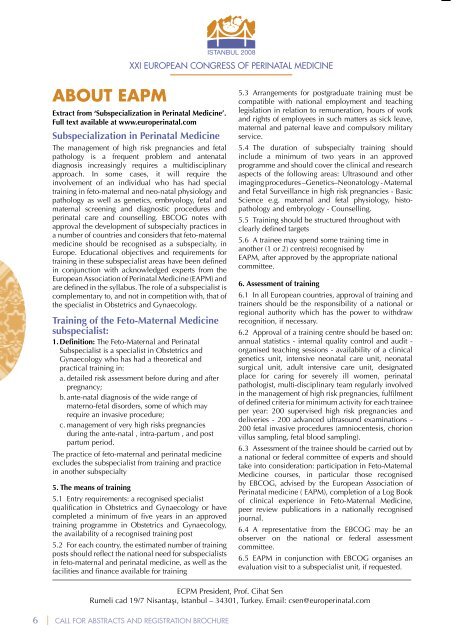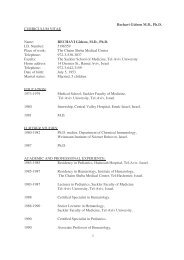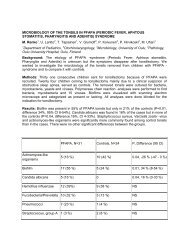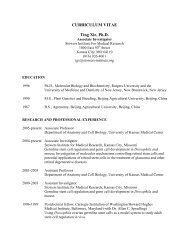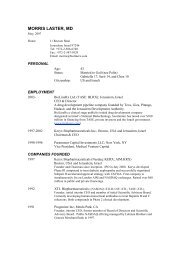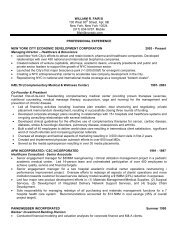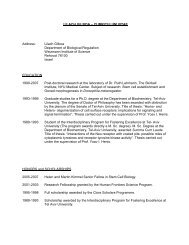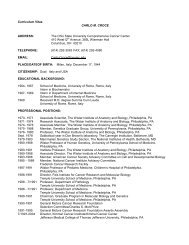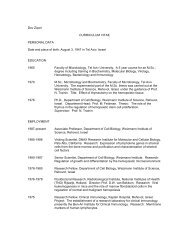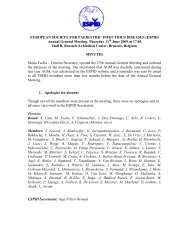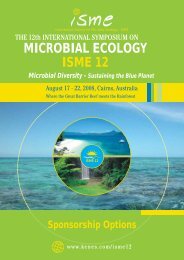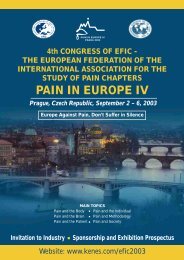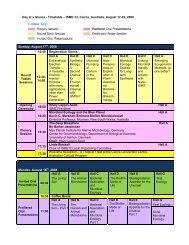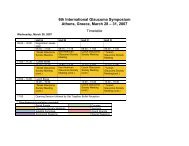PERINATAL MEDICINE
PERINATAL MEDICINE
PERINATAL MEDICINE
Create successful ePaper yourself
Turn your PDF publications into a flip-book with our unique Google optimized e-Paper software.
ABOUT EAPM<br />
XXI EUROPEAN CONGRESS OF <strong>PERINATAL</strong> <strong>MEDICINE</strong><br />
Extract from ‘Subspecialization in Perinatal Medicine’.<br />
Full text available at www.europerinatal.com<br />
Subspecialization in Perinatal Medicine<br />
The management of high risk pregnancies and fetal<br />
pathology is a frequent problem and antenatal<br />
diagnosis increasingly requires a multidisciplinary<br />
approach. In some cases, it will require the<br />
involvement of an individual who has had special<br />
training in feto-maternal and neo-natal physiology and<br />
pathology as well as genetics, embryology, fetal and<br />
maternal screening and diagnostic procedures and<br />
perinatal care and counselling. EBCOG notes with<br />
approval the development of subspecialty practices in<br />
a number of countries and considers that feto-maternal<br />
medicine should be recognised as a subspecialty, in<br />
Europe. Educational objectives and requirements for<br />
training in these subspecialist areas have been defined<br />
in conjunction with acknowledged experts from the<br />
European Association of Perinatal Medicine (EAPM) and<br />
are defined in the syllabus. The role of a subspecialist is<br />
complementary to, and not in competition with, that of<br />
the specialist in Obstetrics and Gynaecology.<br />
Training of the Feto-Maternal Medicine<br />
subspecialist:<br />
1. Definition: The Feto-Maternal and Perinatal<br />
Subspecialist is a specialist in Obstetrics and<br />
Gynaecology who has had a theoretical and<br />
practical training in:<br />
a. detailed risk assessment before during and after<br />
pregnancy;<br />
b. ante-natal diagnosis of the wide range of<br />
materno-fetal disorders, some of which may<br />
require an invasive procedure;<br />
c. management of very high risks pregnancies<br />
during the ante-natal , intra-partum , and post<br />
partum period.<br />
The practice of feto-maternal and perinatal medicine<br />
excludes the subspecialist from training and practice<br />
in another subspecialty<br />
5. The means of training<br />
5.1 Entry requirements: a recognised specialist<br />
qualification in Obstetrics and Gynaecology or have<br />
completed a minimum of five years in an approved<br />
training programme in Obstetrics and Gynaecology,<br />
the availability of a recognised training post<br />
5.2 For each country, the estimated number of training<br />
posts should reflect the national need for subspecialists<br />
in feto-maternal and perinatal medicine, as well as the<br />
facilities and finance available for training<br />
6 CALL FOR ABSTRACTS AND REGISTRATION BROCHURE<br />
5.3 Arrangements for postgraduate training must be<br />
compatible with national employment and teaching<br />
legislation in relation to remuneration, hours of work<br />
and rights of employees in such matters as sick leave,<br />
maternal and paternal leave and compulsory military<br />
service.<br />
5.4 The duration of subspecialty training should<br />
include a minimum of two years in an approved<br />
programme and should cover the clinical and research<br />
aspects of the following areas: Ultrasound and other<br />
imaging procedures –Genetics–Neonatology - Maternal<br />
and Fetal Surveillance in high risk pregnancies - Basic<br />
Science e.g. maternal and fetal physiology, histopathology<br />
and embryology - Counselling.<br />
5.5 Training should be structured throughout with<br />
clearly defined targets<br />
5.6 A trainee may spend some training time in<br />
another (1 or 2) centre(s) recognised by<br />
EAPM, after approved by the appropriate national<br />
committee.<br />
6. Assessment of training<br />
6.1 In all European countries, approval of training and<br />
trainers should be the responsibility of a national or<br />
regional authority which has the power to withdraw<br />
recognition, if necessary.<br />
6.2 Approval of a training centre should be based on:<br />
annual statistics - internal quality control and audit -<br />
organised teaching sessions - availability of a clinical<br />
genetics unit, intensive neonatal care unit, neonatal<br />
surgical unit, adult intensive care unit, designated<br />
place for caring for severely ill women, perinatal<br />
pathologist, multi-disciplinary team regularly involved<br />
in the management of high risk pregnancies, fulfilment<br />
of defined criteria for minimum activity for each trainee<br />
per year: 200 supervised high risk pregnancies and<br />
deliveries - 200 advanced ultrasound examinations -<br />
200 fetal invasive procedures (amniocentesis, chorion<br />
villus sampling, fetal blood sampling).<br />
6.3 Assessment of the trainee should be carried out by<br />
a national or federal committee of experts and should<br />
take into consideration: participation in Feto-Maternal<br />
Medicine courses, in particular those recognised<br />
by EBCOG, advised by the European Association of<br />
Perinatal medicine ( EAPM), completion of a Log Book<br />
of clinical experience in Feto-Maternal Medicine,<br />
peer review publications in a nationally recognised<br />
journal.<br />
6.4 A representative from the EBCOG may be an<br />
observer on the national or federal assessment<br />
committee.<br />
6.5 EAPM in conjunction with EBCOG organises an<br />
evaluation visit to a subspecialist unit, if requested.<br />
ECPM President, Prof. Cihat Sen<br />
Rumeli cad 19/7 Nisantaşı, Istanbul – 34301, Turkey. Email: csen@europerinatal.com


